
BBC Budapest Correspondent
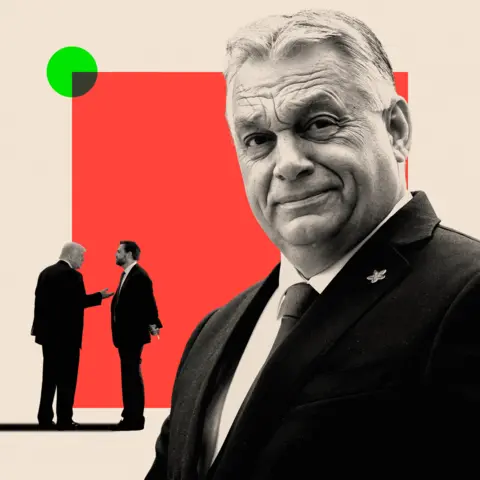 BBC
BBCHungarians have a popular saying: “Visszanyal a fagyi”. Translation: “The ice-cream licks back.” In other words, watch out, because what you enjoy devouring, might enjoy devouring you.
Hungarian Prime Minister Viktor Orban has assiduously attacked a liberal world view for at least two decades, transforming the country into what he has variously called an “illiberal democracy” and nation of “Christian liberty”.
Meanwhile he has drawn admirers around the world, including US Deputy President JD Vance and Georgian Prime Minister Irakli Kobakhidze. US President Donald Trump has called Orban “smart” and “a tough person”.
“One of the most respected men, they call him a strong man,” Trump said in September 2024.
Ahead of the next Hungarian election in April 2026, the LGBTQ community appear to be among Orban’s targets – his Fidesz party rubber stamped a new law that sought to ban Pride from going ahead. And yet between 100,000 and 200,000 people turned out last month – up from just 35,000 last year.
But watching huge crowds march through Budapest to celebrate gay pride, free speech and the right to assemble – all in defiance of the ban – many wonder: could the liberal worldview bite back?
 Attila Kisbenedek via Getty
Attila Kisbenedek via GettyAnd in some ways, that in itself is the wrong question. Orban’s power is indeed now under threat, but not in the way – or from the people – one might expect.
As the real challenge comes not from the liberal left, but the centre right.
A surprise challenger from Orban’s own circle
Peter Magyar, a 44-year-old formerly of Orban’s own circle, appeared as a surprise challenger in February 2024.
This followed a scandal involving a decision to pardon a man convicted of covering up child sexual abuse that led to President Katalin Novak resigning on live television. Justice Minister Judit Varga (Magyar’s ex-wife) also resigned – and the scandal dealt a blow to Orban’s claim to stand for traditional family values.
Magyar gave a long interview to Partizan, the flagship opposition YouTube channel, blasting what he called the nepotism and corruption of the governing party.
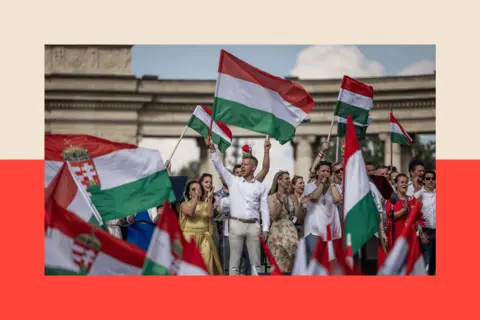 Janos Kummer/Getty Images
Janos Kummer/Getty ImagesRobert Puzser, an opposition activist who heads a new, non-party initiative called Citizens Resistance, says that Magyar is treading carefully, amid Fidesz officials and certain quarters of the media trying to portray him as a liberal or leftist.
Magyar, he argues, is trying to avoid alienating his conservative base in the countryside, which until recently was Orban’s undisputed heartland. And he has created his own powerful narrative – of a Hungary that is collapsing.
Most national polls put Tisza, Hungary’s main opposition party led by Magyar, between 9% and 18% ahead of Orban’s party. Only one, the pro-government thinktank Viewpoint Institute, still puts Fidesz narrowly ahead.
The parlous state of state hospitals, state schools, and state railways are all being used against Orban by Magyar and his party. Now, Orban’s long-established playbook, so admired abroad, is starting to fail at home – and it leaves Hungary closer than ever to ousting a man who has ruled it for the past 15 years.
Orban’s tried-and-tested strategy
Orban has been in power for 19 of the 35 years since the fall of Communism in 1990, making him one of the most experienced leaders in the EU. In the early 1990s, Fidesz broke away from its liberal roots, and Orban instilled a new conservative, nationalist, right-wing identity.
In 2015, as scores of people travelled to Europe asking for asylum, Orban referred to them as part of “a migratory movement composed of economic migrants, refugees and also foreign fighters”. He has opposed military support for Ukraine since the full-scale Russian invasion in February 2022, and also opposes Ukraine’s bid for EU membership.
A cornerstone of Orban’s playbook has been his ability to identify what his voters fear: this was true of each of his landslide victories, in 2010, 2014, 2018, and 2022.
 Reuters/Lisa Leutner
Reuters/Lisa LeutnerA public opinion survey by the Publicus agency carried out from 23-25 June found 45% of people were in favour of the Pride march in Budapest and 48% were against. Just 8% of Fidesz voters approved, however, so it was a flag to rally his own camp behind.
Since the march, Fidesz supporters have shared some provocative images from Budapest Pride, including nudity and the tale of a man arrested by police for masturbating in public.
After the event, folk singer Marianna Majorosi, whose song was performed during a drag queen show at the Pride event, said, “it deeply upsets me that as a performer I have no right to prevent someone from doing this to my voice”. Orban expressed his support for her on Facebook.
In 2022, the government organised a referendum on child protection to coincide with the general election. The questions included: “Do you support allowing children in public schools to participate in sexual orientation classes without parental consent?” And, “do you support the promotion of gender reassignment for minors?”
A total of 3.7 million Hungarians took part, with the vast majority voting, “No”. Government officials have since cited that referendum result as proof that Hungarians oppose what Pride stands for.
The winner takes all
Another key to Orban’s playbook is that the winner takes all. Orban lost power in 2002 then returned to office in 2010, and in a new electoral law of 2011 he shrank Parliament from 386 seats to 199 and abolished the second round of elections, effectively channelling votes to the strongest party.
While the fractious opposition parties fought for the crumbs, Fidesz took the cake. They took 45% of the vote in 2014, which translated to 67% of seats in Parliament. The former system of proportional representation was replaced by something closer to the first-past-the-post system, as used in the UK.
He has also appointed Fidesz-friendly judges to the Constitutional and Supreme Court.
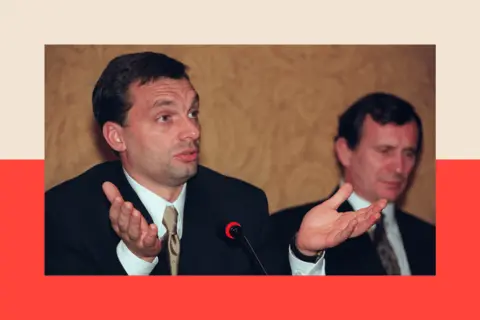 Tim Sloan/ AFP via Getty
Tim Sloan/ AFP via GettyIn 2014 he said that the “illiberal state” he was constructing “does not reject the fundamental principles of liberalism such as freedom… but it does not make this ideology the central element of state organisation”.
Orban is still struggling to find the right name for his invention. András Lánczi, a philosopher widely considered a strong influence on the prime minister, calls it “political realism… Ideas based on experience rather than the utopias and moralising that leftists like so much”.
How he won over world leaders
Orban rules by bullet-points, simple messages culled from unpublished opinion surveys commissioned by his government to find out what is worrying the public. Pro-government media, social media, and nationwide billboards then act as an echo chamber for these messages.
Some leaders overseas appear to admire his approach, while many MAGA Republicans love Orban for confronting “woke” culture.
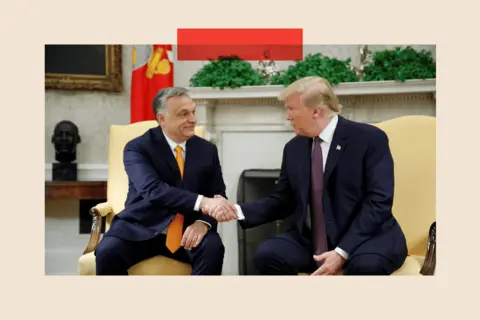 Reuters/Carlos Barria
Reuters/Carlos BarriaThe Slovak and Georgian prime ministers are also seemingly firm admirers, as are Alice Weidel (Alternative for Germany), Geert Wilders (Dutch Party for Freedom), and Herbert Kickl (Austrian Freedom Party).
Orban has instilled in his countryfolk “a new self-confidence”, Mr Lánczi suggests, after centuries of foreign rule. “This nation has become stronger, and we would like to believe that we are not inferior to any other nations.”
But just as he reaches the height of his fame abroad, the carpet is apparently being tugged from under his feet at home.
Are cracks starting to appear?
Peter Magyar has toured the country almost continuously, attacking the government for conditions in hospitals, a failing rail network and public service wages that are among the lowest in Europe.
He draws large crowds, and his visits to hospitals, schools or care homes are broadcast live on Facebook, with many attracting tens of thousands of views.
“We will re-build this country together, brick by brick,” Magyar repeats. “Brick by brick!” chant the crowds, in unison.
Fidesz publicists have dismissed him as a hollow “messiah”, or a traitor from their own ranks. But Magyar has given the public an alternative vision of repairing the homeland.
Orban has himself started to make some mistakes, like backing the ultra-nationalist candidate George Simion in the recent Romanian presidential election, despite a long history of anti-Hungarian remarks. He considered him to be a useful ally in the European Parliament where he shares Orban’s message that “Christian Europe” is under threat. But Simion was the surprise loser of the second round of that election.
Orban’s failure to stop Pride, after he promised his supporters it would not take place, also suggests some weakening of his power.
 SOPA Images via Getty
SOPA Images via GettyBut perhaps most seriously, the Hungarian economy, heavily dependent on the German market, especially German cars manufactured in Hungary, is stagnating. Orban can no longer deliver an improved standard of living.
Even András Lánczi, who believes Orban will win the next election, says: “Unavoidably, there are so many conflicts during such a long time [in power]”, conflicts that “erode trust, erode respect, erode a lot of positive things that unite that political community.”
Battle for the soul of Hungary
Defeat for Orban, who has ruled Hungary for the past 15 years, would be monumental.
“Orban is able to mobilise his core electorate, which is about two million people, but it’s not enough to win the elections,” says Zoltan Kiszelly, a political analyst close to Fidesz.
The Tisza party now also has about two million supporters. More than five million Hungarians voted in the 2022 election, with a 69% turnout – so the election in April 2026 will likely be decided by those who are currently undecided.
“We are looking for policy issues that can attract these 500,000 to one million more voters who are needed to outnumber the opposition,” Mr Kiszelly explained.
In 2022, amid the war in Ukraine, Orban portrayed himself as the “peace” candidate, and claimed the opposition would drag Hungary into war. It was a successful tactic in a country, often overrun in its history by foreign armies. In 2026, Ukraine could help Orban win again, Mr Kiszelly believes.
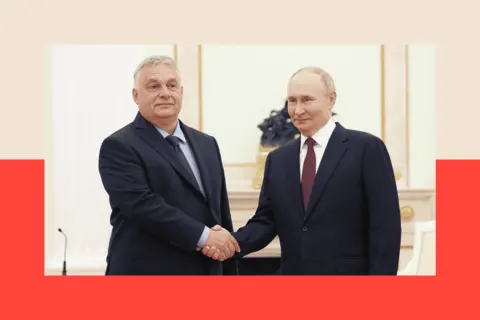 Valery Sharifulin via Getty
Valery Sharifulin via GettyYet if the war in Ukraine is over by then, Orban “the political realist” will be able to claim credit as the Western leader who warned that Ukraine cannot defeat the might of Russia. Or, if the war continues, Fidesz could step up its campaign against Manfred Weber, leader of the European People’s Party (EPP), which supports continued Western military supplies for Ukraine.
“Orban can present himself, once again, as the dove of peace,” Mr Kiszelly explains.
Orban also depicts his good relations with Russian President Vladimir Putin as a guarantee of cheap Russian gas and oil for Hungarian consumers – constantly under threat from EU sanctions against Russia. (Though Orban has not successfully blocked any of the 18 packages of EU sanctions against Russia so far.)
But his opponents hope that Tisza, and Magyar, can maintain their polling lead. Mr Puzser, the opposition activist, believes Tisza will win “sooner or later”.
He describes Hungary as being at a crossroads. “There is a path leading to a democratic transition from this semi-authoritarian, semi-constitutional system,” he argues, “and there is a despotic path leading to a dictatorship.”
As for Orban, he said in March that there was a struggle “for the soul of the Western world” – some see next April’s election as a battle for the soul of Hungary.
Top image credits: Anna Moneymaker/ Leon Neal/ Pierre Crom via Getty
BBC InDepth is the home on the website and app for the best analysis, with fresh perspectives that challenge assumptions and deep reporting on the biggest issues of the day. And we showcase thought-provoking content from across BBC Sounds and iPlayer too. You can send us your feedback on the InDepth section by clicking on the button below.





